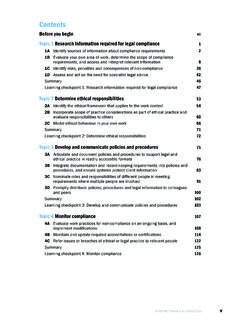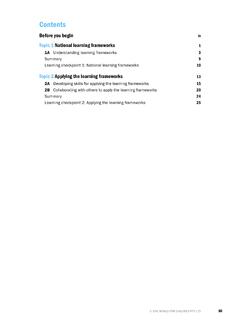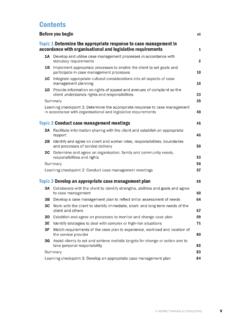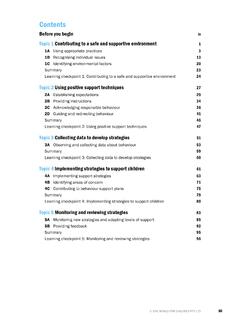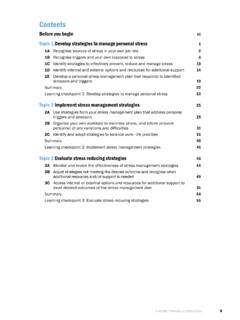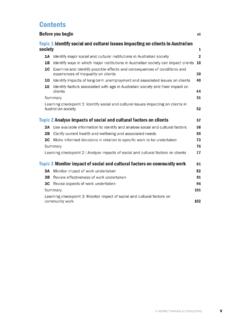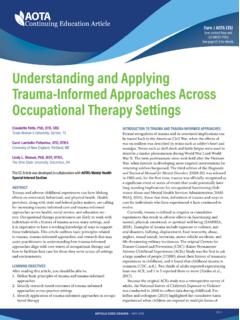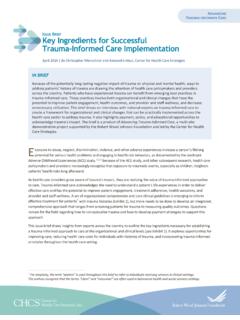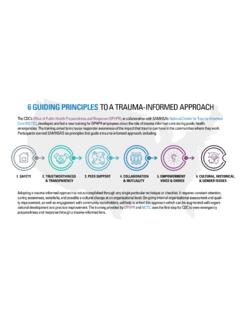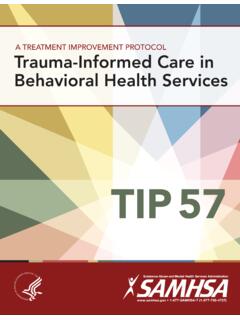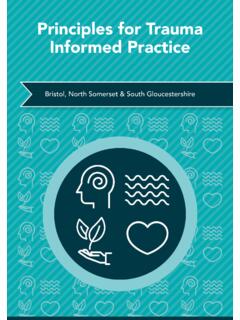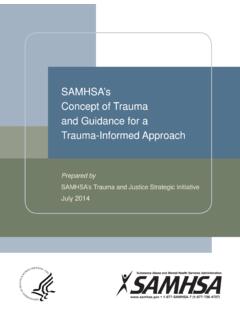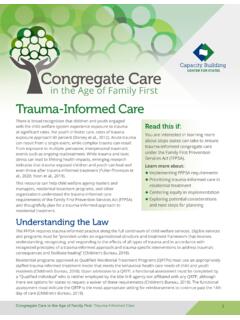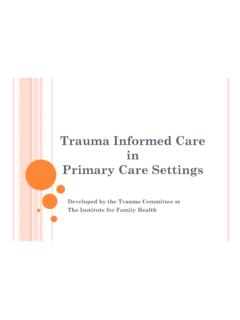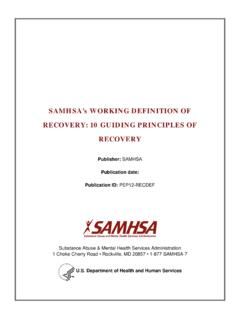Transcription of CHCMHS007 Work effectively in trauma informed care
1 ASPIRE TRAINING & CONSULTING vContentsBefore you begin viiTopic 1 Work from a trauma informed care perspective 11A Apply the key principles and practices of trauma informed care 21B Promote safe environments and relationships to prevent traumatisation and re-traumatisation 131C Respond appropriately to disclosures of child or elder abuse or neglect 251D Respond to behaviours and distress related to trauma using principles of trauma informed care 341E Assist individuals affected by trauma to identify personal resources and strengths 381F Recognise the coping strategies and adaptations of individuals who have experienced trauma 42 Summary 47 Learning checkpoint 1: Work from a trauma informed care perspective 48 Topic 2 Utilise self- care strategies 552A Apply self- care strategies in managing re-traumatisation and vicarious trauma 56 Summary 60 Learning checkpoint 2.
2 Utilise self- care strategies 61 Topic 3 Contribute to the continuous improvement of trauma informed care in services 633A Reflect upon own practice and work environment and identify opportunities to embed trauma informed care and practice in service delivery 643B Identify barriers and refer to appropriate personnel 673C Participate in organisation policy development on trauma informed care according to job role 713D Identify and participate in strategies to enhance service delivery of trauma informed care 743E Invite and respond to consumer feedback on trauma informed practices and service delivery 78 Summary 80 Learning checkpoint 3: Contribute to the continuous improvement of trauma informed care in services 812 CHCMHS007 WORK effectively IN trauma informed CARE1A Apply the key principles andpractices of trauma informed careTrauma informed care has been developed to address the concerns with previous approaches to mental health and trauma care .
3 Based on extensive research and experience, trauma informed care seeks to work collaboratively and holistically with a range of services, and the individual experiencing trauma . Definition of traumaTrauma is a normal reaction to an abnormal event. Most people who experience trauma will have a stress reaction of some kind. You need to be able to recognise these reactions to help people deal with event may have caused trauma if:XXit happened unexpectedlyXXit happened repeatedlyXXit happened during childhood XXit caused intense fearXXit resulted in a feeling of powerlessness and loss of or emotional traumaIt is important to note that whether or not a traumatic event involves death, people who are affected by trauma must cope with a sense of loss. The loss may be of feeling safe and secure and of having a particular way of seeing the world.
4 The natural reaction to loss is grief. People who are affected by trauma go through a grieving process in the same way that someone bereaved by death or emotional trauma may be from: XXaccidents and injuriesXXthe sudden death of someone closeXXdealing with a life-threatening illness or disabling conditionXXsurgeryXXthe end of a significant relationshipXXa difficult or humiliating experienceXXliving in constant fear, such as living in a neighbourhood where violent crime is of trauma in the general population trauma is prevalent in Australian society, with 57 per cent of the population reporting exposure t o trau matic events in their lifetime. Post-traumatic stress affects per cent of people who have experienced trauma . Men are more likely to experience trauma than women, with the exception of sexual assault.
5 However, females are more vulnerable to post-traumatic stress than males. ASPIRE TRAINING & CONSULTING6 ASPIRE TRAINING & CONSULTINGCHCMHS007 WORK effectively IN trauma informed CARES ingle-event traumaTrauma may be caused by a single event, such as an accident, or a violent act. trauma impacts the person s ability to cope. The person may perceive an ongoing threat as a result of the incident, which may impact their choices and wellbeing. For example, they may avoid driving a car so as to avoid an accident. The impact of trauma can accumulate throughout the lifespan, increasing in severity and impacting all aspects of a person s life. Complex traumaWhen trauma is endured for a long period of time and is caused by premeditated, interpersonal trauma , people experience complex trauma .
6 Complex trauma may result for hostages, or people who experience long-lasting abuse in childhood, where the person has been intentionally violated or exploited. Complex trauma can be prolonged, and can develop into different mental illnesses, such as depression, or complex post-traumatic stress trauma , in contrast with single-event trauma , is cumulative and repetitive. It can affect all internal states of a person and can affect their ability to form positive relationships with others. Here are some situations that may result in complex that may cause complex trauma XXBeing held hostageXXProlonged childhood abuse, such as physical, sexual and emotional abuseXXProlonged childhood neglectXXWitnessing domestic violenceXXGenocide, war or civil unrestXXBeing a refugeeXXProtracted domestic violenceXXSustained substance abuse, mental illness or physical of trauma informed care practiceTrauma informed care practice is the preferred response to trauma , and is based on years of trauma research.
7 It is important that trauma informed care does not add to existing trauma through seclusion, exclusion, restraint or force. To read more about the principles of trauma informed care , visit Mental Health Coordinating Council at: WORK effectively IN trauma informed CAREKey features of trauma informed care and practice ServicesTrauma informed care and practice has been developed on a foundation of knowledge and practice accumulated over a number of years. Review the following table to see the summary of key features of trauma informed care . features of trauma informed careXXCare services are inclusive of the survivor s perspectiveXXServices recognise that coercive interventions cause traumatisation/re-traumatisation and are to be avoidedXXServices recognise high rates of complex posttraumatic stress disorder (PTSD)
8 And other psychiatric disorders related to trauma exposure in children and adultsXXServices provide early and thoughtful diagnostic evaluation with focused consideration of trauma in people with complicated, treatment-resistant illnessXXServices recognise that mental health treatment environments are often traumatising, both overtly and covertlyXXServices recognise that the majority of mental health staff are uninformed about trauma , do not recognise it and do not treat itXXServices value consumers in all aspects of careXXServices respond empathically, be objective and use supportive languageXXServices offer individually flexible plans or approachesXXServices avoid all shaming/humiliationXXServices provide awareness/training on retraumatising practicesXXCare Services are institutions that are open to outside parties.
9 Advocacy and clinical consultantsXXServices provide training and supervision in assessment and treatment of people with trauma historiesXXServices focus on what happened to the client rather than what is wrong with you ( a diagnosis)XXServices ask questions about current abuseXXServices address the current risk and develop a safety plan for dischargeXXServices presume that every person in a treatment setting may have been exposed to abuse, violence, neglect or other traumatic experiencesSource: Mental Health Coordinating Council (MHCC) 2013, trauma - informed care and Practice: Towards a cultural shift in policy reform across mental health and human services in Australia, A National Strategic Direction, Position Paper and Recommendations of the National trauma - informed care and Practice Advisory Working Group, Authors: Bateman, J & Henderson, C (MHCC) Kezelman, C (Adults Surviving Child Abuse, ASCA) ASPIRE TRAINING & CONSULTING ASPIRE TRAINING & CONSULTING 15 TopiC 1 WORk FROM A trauma informed care PERSPECTIVEIn the case of integrating trauma informed care , follow your code of practice guidelines about ethics, and forming collaborative relationships with other organisations.
10 The code of practice will also refer to how to maintain a safe and stable example of practice guidelines are ASCA s Practice Guidelines for Treatment of Complex trauma and trauma informed care and Service Delivery, located discriminate means to treat someone unfairly or favour others. Discrimination is never acceptable behaviour and is against the is unlawful to discriminate against people on the basis of age, gender, ethnicity, disability or impairment, marital status, sexual preference, political or religious beliefs. Organisations within Australia must comply with a variety of federal Acts, national standards, and state Acts aimed to prevent discrimination and foster equality of opportunity. When providing trauma care , treat all individuals as equal.
